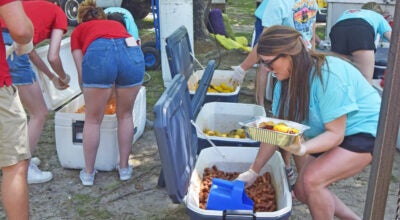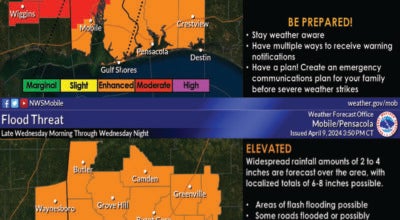Bivens column: Keep food safe in outages
Published 4:21 pm Tuesday, January 6, 2015
In the past few years Alabama has felt the impact of floods, tornadoes, hurricanes, and even ice storms. In these times of confusion it is not always easy to know exactly what to do.
After the trauma and shock have worn off, there remains the overwhelming job of cleaning up. One of the biggest areas of concern is the safety of food and water.
Keeping Refrigerated and Frozen Food Safe
One main factor in keeping food safe is keeping it at the proper temperature. The only way you can know if your food is at the correct temperature is to use a thermometer. There are several types that you need to have in your kitchen. One is a refrigerator/freezer thermometer. One of these thermometers should be placed in your refrigerator to assure you that the food is kept at below 40 degrees. Another one of these kinds of thermometers should go in your freezer to insure that your food is kept at below 0 degrees.
In a refrigerator without power food will remain chilled for up to four to six hours. This temperature will keep the longest if you do not open the door of the refrigerator while the power is out. If you think that the power will be out longer than this, add bags of regular ice in your refrigerator to keep the temperatures cool longer. Place the ice on the upper shelves and pans to catch the melting ice on the lower shelves. The more ice you use, the longer the temperature will stay cool.
Open the door only to add ice. Place the thermometer in the area farthest from the ice. Check the refrigerator temperature when adding ice. As soon as the power returns check to be certain that food has been kept below 40 degrees.
Keeping Frozen Food Frozen
When the power goes off, food will remain frozen in your freezer for several hours – maybe as long as several days. If your freezer is full and not opened during the power outage, the food will remain frozen for up to two days – even if it is in the heat of the summer. If the freezer is only half full, food may store frozen only one day. This time will also depend on the seals in your freezer. If there is leaking around the seals allowing cold air to escape, your food will thaw much faster.
Replace loose gaskets now to help preserve your food when the power does go out in the future. Other factors that affect how long your food will remain frozen when the power goes out are:
• the size of the freezer. The bigger the freezer the longer the food will stay frozen. For example, large blocks of ice take longer to thaw than small ones.
• the type of food in the freezer. For example, food with more water like fruits, vegetables and meats, will stay frozen longer than food with little water such as bread and nuts.
• the insulation in the freezer. For example, if your freezer has only one thin layer of insulation, food will thaw more rapidly.
• the cavity depth of the freezer. For example, the deeper chest-type freezers allow the food to remain frozen longer than upright freezers.
So, how does one cook when the power goes off?
After a disaster has knocked out electricity or gas lines, cooking meals can be hazardous if a few basic rules are not followed.
Charcoal or gas grills are the most obvious alternative sources of heat for cooking. Never use them indoors. If you do, you risk both asphyxiation from carbon monoxide and the chance of starting a fire that could destroy your home.
Likewise, camp stoves that use gasoline or solid fuel should always be used outdoors.
Use small electrical appliances to prepare meals if you have access to an electrical generator with sufficient capacity.
You can use wood for cooking in many situations. You can cook in a fireplace if the chimney is sound. Don’t start a fire in a fireplace that has a broken chimney. Be sure the damper is open.
If you have to build a fire outside, build it away from buildings, never in a carport. Sparks can easily get into the ceiling and start a house fire.
Never leave an open fire, canned heat, or candle unattended. Keep children away at all times.
For more information on food safety when the power goes out, please call the Escambia County Extension office at 251.867.7760 and request publication HE-670.





